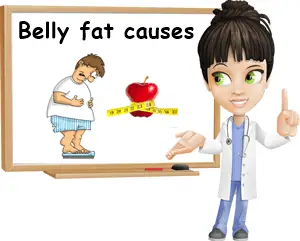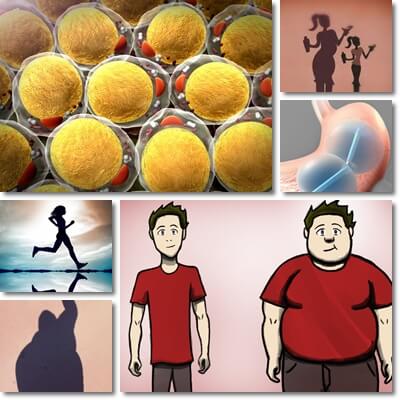Belly fat or abdominal fat is carrying weight around the middle, more exactly on the stomach. Belly fat is considered unaesthetic in both men and women and a sign of ill health because it indicates a higher probability of developing diabetes, heart disease and obesity. Getting a flatter stomach is often difficult because belly fat is hard to get rid of even with diet and exercise. Knowing what causes belly fat is the first most important step in identifying the most efficient methods and solutions to lose the excess stomach adipose tissue.
What is belly fat? Belly fat is adipose tissue in the front abdominal area. It is also known as stomach or abdominal fat and is common in adults of all ages. The most bothersome aspect of carrying weight around the middle area is the fact that it is especially hard to get rid of. Getting rid of belly fat often focuses on obtaining a flat stomach and toned muscles with the help of diet and exercise and is believed to be a health priority. This is because excess adipose tissue on the abdominal area, surrounding the internal organs, is known to increase the risks for chronic diseases such as diabetes and heart disease.

The body shape where belly fat is most common and visible is the apple shape. Having an apple shape means you carry most of your excess weight above the waist, on your stomach, hips, arms, back and chest. In those with an apple shape, the upper part of the body is bigger than the rest. The more weight you carry overall, the more visible your body shape, including the belly fat. Individuals with an apple-shape body simply have more belly fat because that is where their body naturally stores fat reserves.
If you suspect your belly fat has other causes than weight gain and related conditions, look for any out of the ordinary symptoms like pain, nausea, signs of infection etc. Different medical conditions such as worms and intestinal parasites, cirrhosis of the liver, irritable bowel syndrome, water retention may also cause the appearance of belly fat or a distended stomach resembling belly fat.
What causes belly fat?
There are different causes behind belly fat, some medical and some not. The number one factor is weight gain and here are the top causes behind it:
1) Eating too many calories. There is a certain number of calories we need every day, depending on our age, physical activity, intellectual effort and other factors. Exceeding the number of calories you need to eat in a given day can result in weight gain and belly fat.
2) Eating too many carbohydrates. The easiest way for most people to gain weight and get a belly is eating too many carbs (pasta, rice, bread, crackers, biscuits, pastry, sweets, baked goods). Because we have to and actually eat more carbohydrates than protein and fats, we can get belly fat easily when we eat more than we need and should.

3) You’re not eating home cooked meals. If you’re not eating food you are making yourself at home from actual fruit, vegetables, meat and herbs, then you are most likely eating high-calorie processed foods and this causes inflammation and weight gain, including belly fat. Actually, the type of belly fat surrounding internal organs is the most dangerous and results from not eating real food.
4) Stress. When you’re stressed, you eat unhealthy foods. Whether it’s because you don’t have time to cook or crave unhealthy foods, stress makes you choose processed foods rich in sugar and fats, causing weight gain. Stress also means your body produces more stress hormones which influence the way your body burns fat, resulting in belly fat accumulating.
5) Hormonal imbalances. Endocrine problems means hormonal imbalances and hormones are directly involved in how our body processes nutrients and deposits fats. For example, hypothyroidism causes a slow metabolism and weight gain, including belly fat. Polycystic ovary syndrome is also known to cause weight gain.
6) Age and related hormonal changes. Our metabolic rate slows down with age because our body produces less of certain hormones which causes us to burn fats harder and gain weight easier. A slow metabolism due to aging often translates into belly fat, especially in women.
7) Medical conditions causing weight gain and belly fat include: hyperglycemia, being overweight, obesity, diabetes, metabolic syndrome, hypothyroidism etc. Most of these conditions and the resulting belly fat are primarily caused by weight gain.
Why is belly fat so hard to lose? Belly fat is often the hardest to lose. First of all, it requires the most work and sometimes you may not have the time or energy to work as hard as you need to in order to lose the excess stomach fat. If you are apple-shaped and carry most of your weight in the upper part of your body, then your belly fat is more likely to be more visible than that of a pear-shaped individual. Bloating and various digestive conditions make it even more visible.
How to reduce and get rid of belly fat
In order to lose belly fat, you need a combination of both diet and specific exercises with an intense rhythm. Here are the best 7 solutions to get rid of belly fat:
1) Cardio and weights. The best types of exercises to reduce or lose belly fat are cardio and weight training. Cardio is intense, works the entire body and helps lose fat fast, while weights are good for building muscle mass where you need it, which helps burn fats faster. The more intense the exercises, the more chances you have to lose the belly fat.
2) More protein and fiber, less carbohydrates. Eating more protein like lean meat, eggs, dairy with low fat content and more vegetables like spinach, arugula, lettuce and other leafy greens can boost your weight loss and reduce belly fat significantly faster. Carbohydrates should be consumed in moderation and gotten from vegetables rather than refined cereals and from small amounts of whole grains (read more about the best protein food sources and benefits of whey protein).
3) Eat home cooked meals. This helps you make healthier, better food choices and avoid processed foods that contribute to weight gain and belly fat. What we eat accounts for 70 to 80% of our weight loss success, which is why diet is crucial for reducing belly fat.
4) Sleep enough and manage stress. Getting enough sleep is a great way to help reduce stress and balance the endocrine system, preventing belly fat as a result of hormonal imbalances.
5) Stay hydrated. Drinking water helps keep you hydrated and your body working optimally. Water regulates transit time and can help the body process nutrients better, contributing to a slim figure.
6) Vitamin C. The role of vitamin C for reducing or losing belly fat completely is something nobody tells you about. Vitamin C taken daily regulates how our body works. It reduces inflammation that can contribute to belly fat, regulates transit time to help us eliminate what we don’t use but could store in our belly or elsewhere. It improves the way our body absorbs nutrients which actively helps with weight loss. Vitamin C corrects hormonal imbalances that encourage weight gain and the development of belly fat. And the list goes on.
7) Magnesium and potassium. Magnesium and potassium are great for water retention, muscle health and muscle tone and to support physical exercise. They are both electrolytes we lose massively during exercise, especially during more intense physical activity like the one required to get rid of belly fat. In order to support our efforts, we need to replenish our reserves of both nutrients which we can do with the help of nuts and seeds rich in magnesium, bananas rich in potassium, sports drinks, naturally sparkling water (usually rich in magnesium, but also sodium so check the label) etc.
Perspective
Belly fat versus a little belly. Getting rid of belly fat doesn’t guarantee you will have a flat stomach. If you are thin, slim, fit or toned, eat well and exercise regularly, but still have a little belly, then know it’s possible that little belly is not entirely fat. Bloating, constipation or simply not going to the bathroom frequently enough, drinking plenty of liquids and several other factors can cause you to have a little belly even though you may not have much belly fat.
